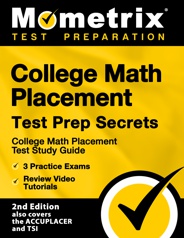If you’re headed for college or university, a math placement test might be in your very near future!
Keep reading to find out more about what the test is like and how you can study.
Why a Math Placement Test is Required
Math Placement Online Course
FAQs
How to Study for the Math Placement Test
What’s on a Math Placement Test?
A math placement test for college usually covers a wide range of topics from basic operations to probability and statistics.
Every college math placement test is a little different, but the topics you’re tested on are generally about the same:
Arithmetic
- Basic operations (addition, subtraction, multiplication, division)
- Fractions (addition, subtraction, multiplication, division)
- Decimals (conversion between fractions and decimals, operations)
- Percentages (calculations, increases, decreases)
- Ratios and proportions
Elementary Algebra
- Simplifying expressions
- Solving linear equations and inequalities
- Graphing linear equations and inequalities
- Operations with polynomials (addition, subtraction, multiplication, division)
- Factoring polynomials
- Solving quadratic equations (factoring, quadratic formula)
- Rational expressions and equations
- Radical expressions and equations
- Systems of linear equations
Intermediate Algebra
- Functions and their properties (domain, range, evaluation)
- Graphing functions and transformations
- Exponents and logarithms (properties, solving equations)
- Complex numbers (operations, polar form)
- Sequences and series (arithmetic, geometric)
- Conic sections (parabolas, ellipses, hyperbolas)
- Polynomial and rational functions (graphing, asymptotes)
Geometry
- Points, lines, planes, and angles
- Triangles (properties, congruence, similarity)
- Quadrilaterals and polygons
- Circles (properties, equations, tangents, arcs)
- Coordinate geometry (distance, midpoint, slope)
- Perimeter, area, and volume of various shapes
Trigonometry
- Trigonometric functions (sine, cosine, tangent, etc.)
- Right triangle trigonometry
- Unit circle and radian measure
- Graphing trigonometric functions
- Trigonometric identities and equations
- Law of Sines and Law of Cosines
- Polar coordinates
Precalculus
- Functions and their inverses
- Polynomial and rational functions
- Exponential and logarithmic functions
- Trigonometric functions and their inverses
- Analytic geometry (conic sections, parametric equations)
- Vectors and vector operations
Statistics and Probability
- Descriptive statistics (mean, median, mode, standard deviation)
- Probability (basic concepts, combinations, permutations)
- Probability distributions (binomial, normal)
- Inferential statistics (confidence intervals, hypothesis testing)
Why a Math Placement Test is Required
College admissions representatives can see your high school transcripts and the courses you’ve taken, but that’s not always enough. Different schools teach in different ways, and not all students pick up the information the same way.
It’s also likely that college math courses won’t exactly match high school courses, so a college-level math placement test score gives a better picture of what you know and where you should start.
If students are placed in math courses that are too advanced or too easy, they can get frustrated. This frustration can lead to poor learning, bad grades, and dropping out. Your college wants you to succeed, just as you do. When you are placed in the right math course, you will perform better, be happier, and are more likely to stay in school!
Math Placement Test Study Guide
Get practice questions, detailed study lessons, and complex subjects broken down into easily understandable concepts.
 Get Your Study Guide
Get Your Study Guide
Math Placement Online Course
If you want to be fully prepared, Mometrix offers an online math placement test prep course. The course is designed to provide you with any and every resource you might want while studying. The math placement test course includes:
The math placement test prep course is designed to help any learner get everything they need to prepare for their math placement test. Click below to check it out!
How to Study for a Math Placement Test
One of the most important parts of preparing for a test is determining which topics you need to brush up on as you study.
To get started with a self-assessment of your knowledge, click on one of the modules below!



